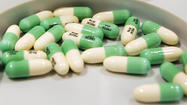ScienceDaily (Nov. 30, 2012) — A significant breakthrough in the understanding of embryonic stem cells has been made by scientists from the Smurfit Institute of Genetics at Trinity College Dublin. The Trinity research group led by Dr Adrian Bracken and funded by Science Foundation Ireland, has just published their findings in the journal, Nature Structural & Molecular Biology.
The new research describes the process whereby genes that are ‘on’ in embryonic stem cells are switched ‘off’. This process is essential in order to convert embryonic stem cells into different cell types such as neurons, blood or heart cells and therefore represents an important breakthrough in the area of regenerative medicine.
The research encompasses both embryonic stem cell research and epigenetics. Embryonic stem cell research is focused on a particular type of cell that is capable of generating the various tissues in the body; for example, muscle, heart or brain. It is particularly relevant due to its potential for regenerating diseased tissues and organs and for the treatment of a variety of conditions including Parkinson’s disease, diabetes and spinal cord injury. Read full article.







